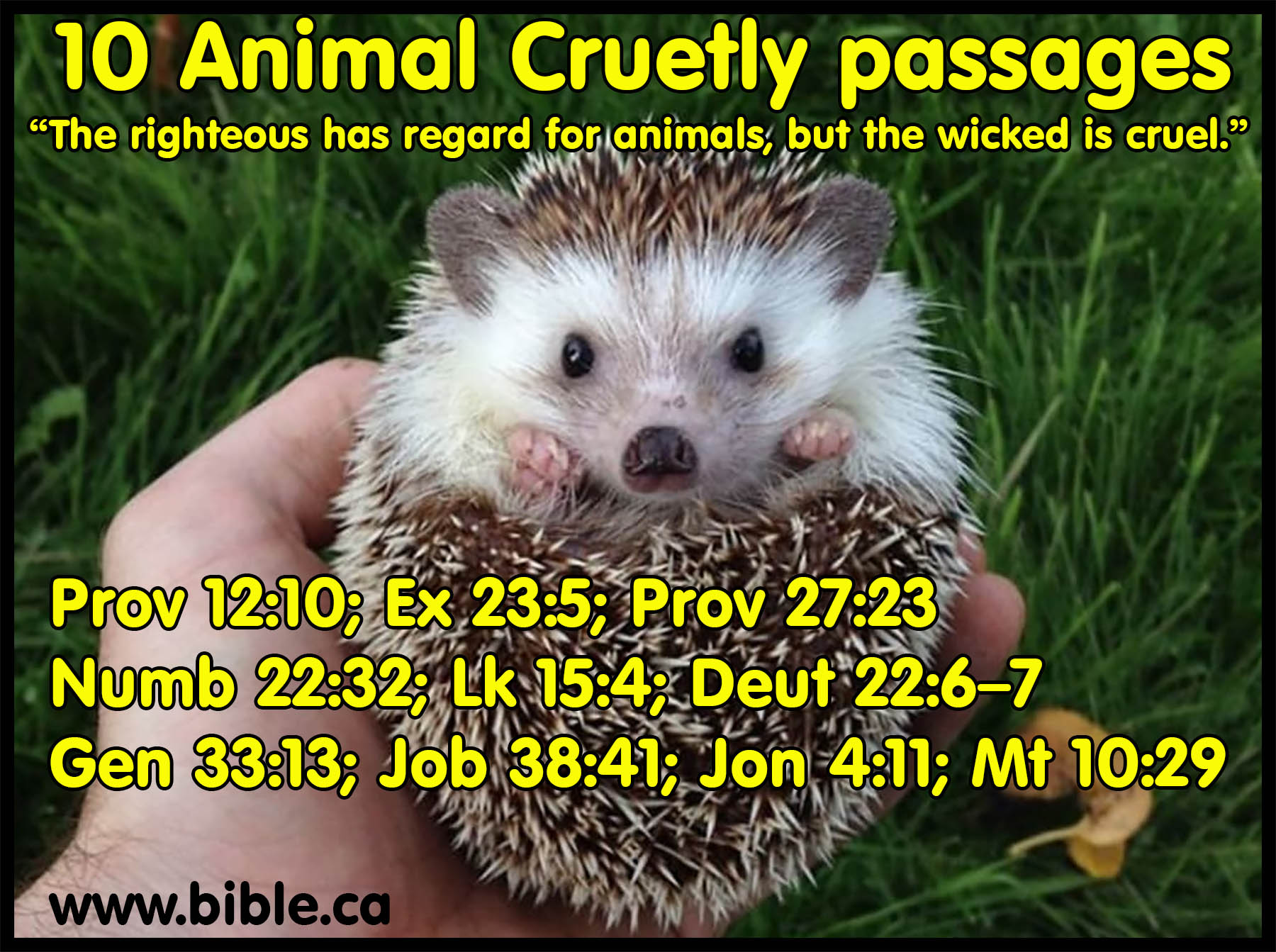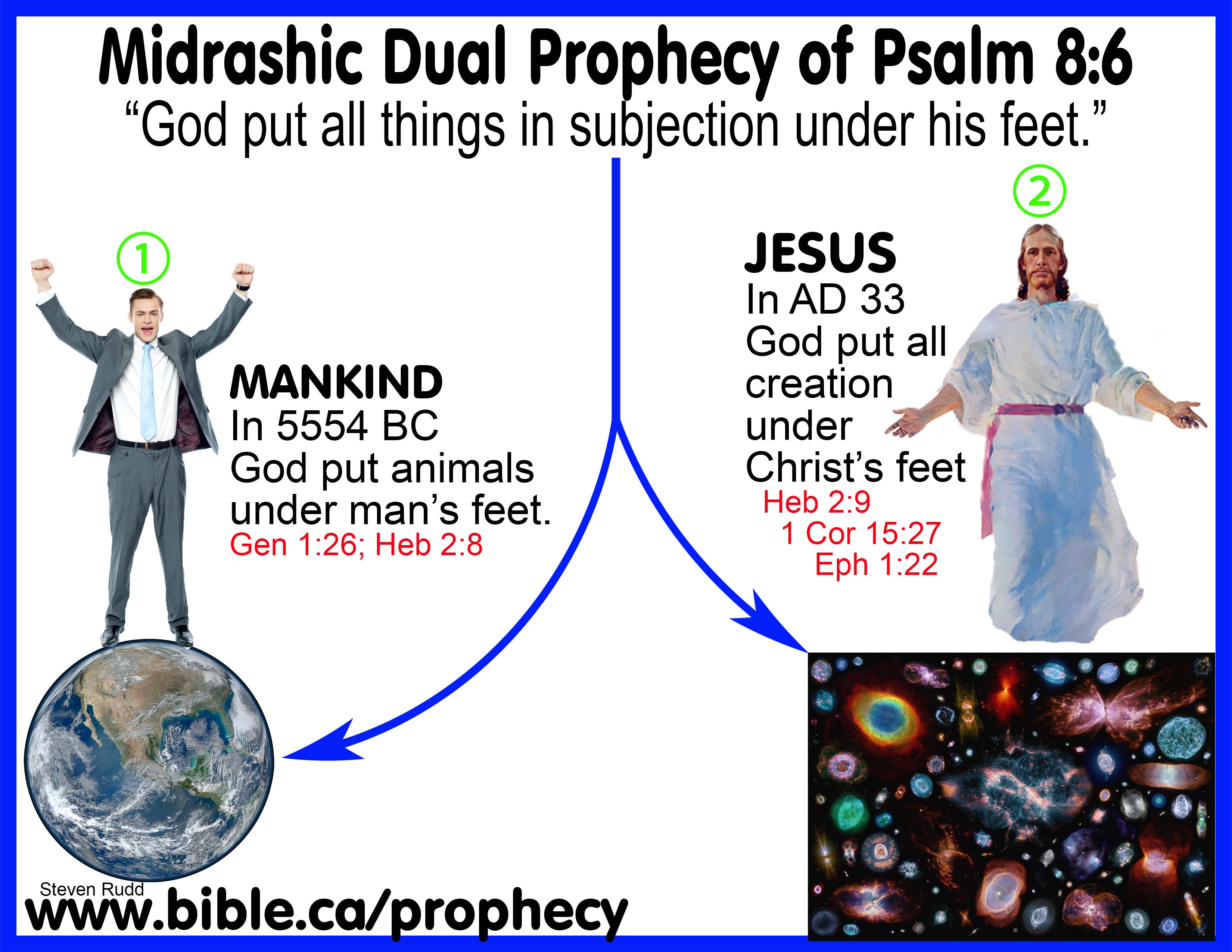Bible Prophecy Fulfilled: Psalm 8:6 “Got put all things in subjection under his feet”
Midrashic dual prophecy of Psalm 8:6 as a template to decode the Olivet Discourse:
1. God put all things in submission under mankind’s feet: Gen 1:26; Ps 8:6
a. In 5554 BC God made man the ruler of every living thing on earth (Gen 1:26): "Then God said, “Let Us make man in Our image, according to Our likeness; and let them rule over the fish of the sea and over the birds of the sky and over the cattle and over all the earth, and over every creeping thing that creeps on the earth.”" (Genesis 1:26)
b. Psalm 8:6 echoes Gen 1:26 in 1000 BC: Psalm 8:6-8 "You make him to rule over the works of Your hands; You have put all things under his feet, All sheep and oxen, And also the beasts of the field, The birds of the heavens and the fish of the sea, Whatever passes through the paths of the seas." (Psalm 8:6-8)
c. Hebrews 2:8 directly quotes Ps 8:6 reinforcing Gen 1:26 that all living things on earth are in subject under mankind’s feet: "You have put all things in subjection under his feet.” For in subjecting all things to him, He left nothing that is not subject to him. But now we do not yet see all things subjected to him." (Hebrews 2:8)
2. Suddenly and without any warning Ps 8:6 is directly applied to Jesus in Heb 2:9 and 1 Cor 15:27:
a. "But we do see Him who was made for a little while lower than the angels, namely, Jesus, because of the suffering of death crowned with glory and honor, so that by the grace of God He might taste death for everyone. For it was fitting for Him, for whom are all things, and through whom are all things, in bringing many sons to glory, to perfect the author of their salvation through sufferings." (Hebrews 2:9–10)
b. "For He has put all things in subjection under His feet. But when He says, “All things are put in subjection,” it is evident that He is excepted who put all things in subjection to Him." (1 Corinthians 15:27)
3. What we learn from this is that Ps 8:6 and Gen 1:26 and were dual messianic prophecies. We would have no way of knowing these verses were messianic until Paul specifically applied them to Jesus in 1 Cor 15:27.
4. In Isaiah 11:6, under the Messiah, there will be animals, typology may extend this into heaven, but this is not certain. However, the broader typology of man ruling animals now, while the messiah rules over man and animals may project into the post second coming period, where man continues to rule over the animals.
a. "And the wolf will dwell with the lamb, And the leopard will lie down with the young goat, And the calf and the young lion and the fatling together; And a little boy will lead them." (Isaiah 11:6)
5.
10 animal cruelty passages:

a. "A righteous man has regard for the life of his animal, But even the compassion of the wicked is cruel." (Proverbs 12:10)
b. "“If you see the donkey of one who hates you lying helpless under its load, you shall refrain from leaving it to him, you shall surely release it with him." (Exodus 23:5)
c. "Know well the condition of your flocks, And pay attention to your herds;" (Proverbs 27:23)
d. "The angel of the Lord said to him, “Why have you struck your donkey these three times? Behold, I have come out as an adversary, because your way was contrary to me." (Numbers 22:32)
e. "“What man among you, if he has a hundred sheep and has lost one of them, does not leave the ninety-nine in the open pasture and go after the one which is lost until he finds it?" (Luke 15:4)
f. "“If you happen to come upon a bird’s nest along the way, in any tree or on the ground, with young ones or eggs, and the mother sitting on the young or on the eggs, you shall not take the mother with the young; you shall certainly let the mother go, but the young you may take for yourself, in order that it may be well with you and that you may prolong your days." (Deuteronomy 22:6–7)
g. "But he said to him, “My lord knows that the children are frail and that the flocks and herds which are nursing are a care to me. And if they are driven hard one day, all the flocks will die." (Genesis 33:13)
h. "“Who prepares for the raven its nourishment When its young cry to God And wander about without food?" (Job 38:41)
i. "“Should I not have compassion on Nineveh, the great city in which there are more than 120,000 persons who do not know the difference between their right and left hand, as well as many animals?”" (Jonah 4:11)
j. "“Are not two sparrows sold for a cent? And yet not one of them will fall to the ground apart from your Father." (Matthew 10:29)
6. This is typical Midrashic style and is useful as a guide in decoding the Olivet Discourse.
By Steve Rudd 2020: Contact the author for comments, input or corrections.


